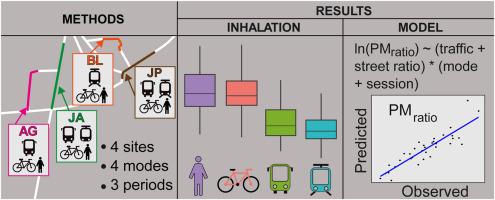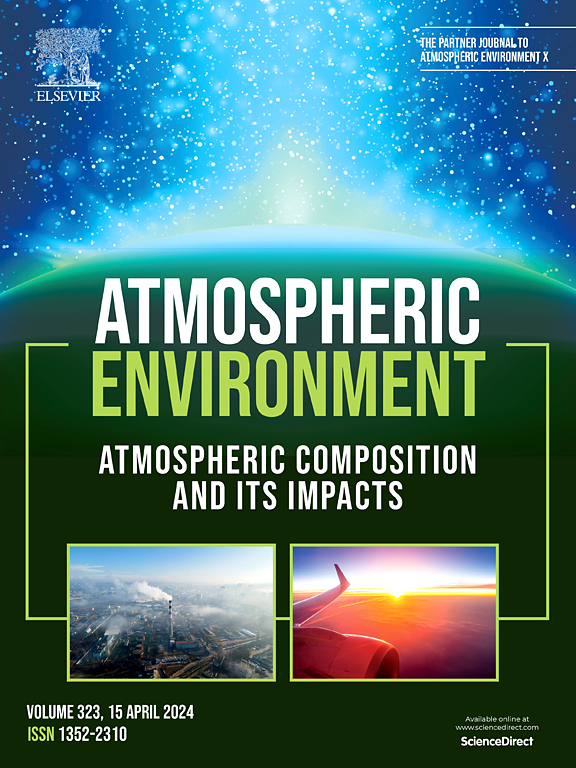Exposure to particulate matter when commuting in the urban area of Grenoble, France
IF 4.2
2区 环境科学与生态学
Q2 ENVIRONMENTAL SCIENCES
引用次数: 0
Abstract
Air pollution is a major cause of mortality and chronic diseases worldwide, with particulate matter (PM) being the primary contributor to this burden. Few studies have yet been carried out on the effect of modes of transport, times of day or travel locations on the exposure of individuals to PM. We conducted an experiment in Grenoble, France, in spring 2022 to study factors determining the individual exposure to PM. Using low-cost sensors (LCS), PM1 (PM < 1 μm) and PM2.5 (PM < 2.5 μm) levels were measured in four transport modes (bike, walk, bus, and tramway), across four different streets and at three different times of the day. Findings are: (i) - the mode of transport plays a more important role on levels of PMratios (PM concentration ratio to reference) than the time of the day or the location, (ii) - PMratios and inhalation doses are higher in active modes of transport (bike, walk) than in passive ones (bus, tram), (iii) – levels of exposure to PM are ranked as: tram < bus < walk < bike, and (iv) – a statistical model has been developed to predict PMratios as a function of transport mode, travel period, street ratio, and traffic. Exposures to PM in trams are found 12%–25% and 13%–20% lower than in passive modes of transport for PM1 and PM2.5, respectively. Wearing LCSs makes it possible to estimate commuters' exposure to PM and their use should be encouraged for prevention purposes.

在法国格勒诺布尔市区通勤时暴露于颗粒物的情况
空气污染是导致全球死亡和慢性疾病的主要原因,而颗粒物(PM)是造成这一负担的主要因素。关于交通方式、时间或出行地点对个人暴露于可吸入颗粒物的影响的研究还很少。2022 年春季,我们在法国格勒诺布尔进行了一项实验,研究决定个人暴露于可吸入颗粒物的因素。我们使用低成本传感器(LCS),测量了四种交通工具(自行车、步行、公共汽车和有轨电车)、四条不同街道和一天中三个不同时间段的 PM1(PM < 1 μm)和 PM2.5(PM < 2.5 μm)水平。研究结果如下(i) - 交通方式对可吸入颗粒物比率(可吸入颗粒物浓度与参考值之比)水平的影响比一天中的时间或地点更重要,(ii) - 主动交通方式(自行车、步行)的可吸入颗粒物比率和吸入剂量高于被动交通方式(公共汽车、有轨电车),(iii) - 可吸入颗粒物的暴露水平按以下方式排序有轨电车、公共汽车、步行、自行车,以及(iv) - 建立了一个统计模型,以预测可吸入颗粒物比率与交通方式、出行时间、街道比率和交通流量的关系。在 PM1 和 PM2.5 方面,有轨电车的 PM 暴露分别比被动式交通工具低 12%-25%和 13%-20%。佩戴有轨电车乘客保护套可以估算乘客暴露于可吸入颗粒物的情况,因此应鼓励使用有轨电车乘客保护套以达到预防目的。
本文章由计算机程序翻译,如有差异,请以英文原文为准。
求助全文
约1分钟内获得全文
求助全文
来源期刊

Atmospheric Environment
环境科学-环境科学
CiteScore
9.40
自引率
8.00%
发文量
458
审稿时长
53 days
期刊介绍:
Atmospheric Environment has an open access mirror journal Atmospheric Environment: X, sharing the same aims and scope, editorial team, submission system and rigorous peer review.
Atmospheric Environment is the international journal for scientists in different disciplines related to atmospheric composition and its impacts. The journal publishes scientific articles with atmospheric relevance of emissions and depositions of gaseous and particulate compounds, chemical processes and physical effects in the atmosphere, as well as impacts of the changing atmospheric composition on human health, air quality, climate change, and ecosystems.
 求助内容:
求助内容: 应助结果提醒方式:
应助结果提醒方式:


